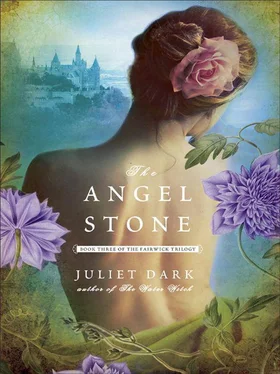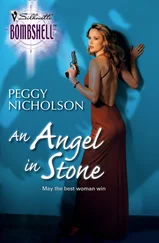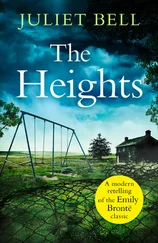As the dirt road turned to cobblestone, it remained deserted, but I sensed movement behind the closed shutters of the houses we passed, a stirring that might have been townspeople pressing their eyes to the cracks and peepholes—or rats scurrying in the walls, carrying plague.
“There are no quarantine signs to mark a house condemned,” William whispered. “And no reek of dying. There’s something else amiss.”
“Fear,” I said, sniffing the air. The clean scent of heather and running water was gone now, replaced by a metallic tang that I could taste at the back of my throat. “The people here are afraid of something, but what?”
As we continued, I saw up ahead a town square with several open-air stalls—perhaps a farmers’ market. But the stalls were deserted, save for a half-empty basket of rotting potatoes and a bit of undyed wool snagged on a wooden contraption set up in front of the market cross. As I looked around the abandoned square, William read a sign affixed to the front of the church. A bright scrap of cloth drew my attention to the far side of the square. Coming closer, I saw it was a crudely made rag doll. Black stitches marked its eyes; undyed wool made up its hair. I picked it up and winced as something stung my hand.
“Leave that!” William cried, grabbing my arm. “Let’s get out of here—”
“William? William Duffy? Is it really you?”
William’s grip on my arm tightened, and I felt his body tense. I could sense him on the verge of bolting, but then he steeled himself and turned around to face the speaker. She was a young woman, perhaps in her early to mid twenties; her long blond hair was pulled back on top but then worn loose in long ringlets flowing over a royal-blue cloak, which was clasped at the throat with a silver pin. Her eyes were Wedgwood blue and grew even larger as they fastened on William.
“It is you. We thought ye were dead. Instead you’re with”—her eyes swiveled to me—“another … woman .” She managed to inject a note of disdain into the word woman . She might as well have said slut .
“So there is someone alive in this godforsaken place,” I said. “Maybe she can tell us what’s going on. Do you know her?”
The girl’s eyes grew even wider. “Know me?” she asked, affronted. “I’m Jeannie MacDougal. William Duffy and I were —are —engaged to be married.”
“Engaged? But he’s only just arrived.”
“Aye, he vanished seven years ago. He left me standing on the kirk steps, feeling like a fool.” Her glance shifted from William to me, her china-blue eyes traveling from my unkempt hair to my stained and wrinkled green skirt, then to my muddy boots and back up again to meet my gaze.
“I recognize you! You’re the demented girl who wandered out of the Greenwood just after William vanished and whom Malcolm Brodie took pity on and married. But then you up and deserted him and your own bairn when the witch hunters came to town. You ran back to Faerie, didn’t you, where you’d left poor William? Weel, never you fear, William, the witch hunters are here in Ballydoon, and they’ll know what to do with this witch.”
I looked around the square again—at the sign on the church door and the contraption in front of the market cross. It was a wooden T, the top bar made from two long pieces of wood with a large hole in the center and two smaller holes on either side. I recognized it from history books as a pillory for holding prisoners and humiliating them in public. The sign on the church door announced a kirk session to investigate charges of witchcraft. We hadn’t wandered into a plague-ridden village: we’d wandered into one in the throes of a seventeenth-century witch hunt. No wonder everyone was hiding behind locked doors. However, Jeannie’s tirade drew a few cautious souls out of their homes to see what was going on. Meanwhile, William was stumbling for an explanation for why he’d skipped out on his fiancée (whose existence he’d conveniently forgotten to mention last night) and disappeared for seven years.
“Jeannie, I was kidnapped the night before our wedding by …” I saw a frantic look in his eyes. Did he dare tell his fiancée and the assembled townspeople that he’d been taken by fairies? Did the citizens of old Scotland still believe in fairies?
“… by pirates,” William concluded.
“Pirates?” Jeannie echoed. “Do ye think I’m daft, William Duffy, that I’d believe sech a story?”
William looked unsure of how to answer that question, so I stepped in for him.
“Actually, pirates were quite active in the … er … right about now. The Barbary corsairs were— are —still raiding European coastal settlements, more commonly in Spain, France, and Italy but also in England, Ireland, and Scotland, well into the late seventeenth century. In fact, in 1631, a Dutch corsair captured nearly an entire village in Ireland and sent them to North Africa, where most lived out the rest of their lives as galley slaves or in harems—”
“Aye,” William interrupted, “that’s where I found this poor lass, enslaved in a sultan’s harem. So, you see, she can’t be the girl you spoke of who married Malcolm Brodie. I was about to be slain when she came to my rescue and pleaded for my life. Only because she was the sultan’s favorite was she successful. Together we escaped and came back here!”
I wasn’t sure that I relished being made a harem slave, even in a fictional account. Fortunately, I had recently reread a Dahlia LaMotte book called The Barbary Beast , in which an Irish girl was abducted by an English corsair who sold her into a sultan’s harem. I recalled the details of the plot now to give me a more active—and virtuous—role.
“Yes, I was sold into a sultan’s harem, but I was able to fend off the sultan’s advances by telling him part of a story each night, which again and again I left unfinished, with the promise that I would tell him the end of the tale the next night if he, er, left me alone. I did this for one hundred nights, until I was able to escape with”—I almost said Jack Wilde , the Barbary pirate of LaMotte’s book, who had secretly listened to the Irish girl’s tales and fallen in love with her wit and eloquence, but I caught myself—“William.”
“I thought ye said she saved you,” Jeannie said coldly.
“We saved each other,” William replied, with a look that made me blush—and that enraged Jeannie.
“And in all this did ye forget that ye were betrothed to me, William Duffy?”
William tore his eyes from me. “Nay, Jeannie, I didn’t forget, but I dared not hope that ye’d remember me in all the long time I’d been away. And I knew that surely a lass as beautiful and well favored as yourself would have married another in these seven years.” William ended with a hopeful look that he quickly masked as a sorrowful one, but Jeannie had turned bright red at what I imagined was an unwelcome reminder of her spinsterhood. If she’d been ready to wed seven years ago, she must be in her mid-twenties by now—in this period, an old maid.
“Weel,” she said, tossing a lock of her gold hair over her shoulder. “It’s not that I didn’t have my share of suitors, but I held out hope that you would come back. And now …” Her red lips parted to reveal a dazzling smile. “Ye have. My father—and brothers—will be glad to see ye, William. You’ll come with me now. I’m sure your”—she gave me an icy stare—“ lady friend can be accommodated at the tavern.”
William glanced at me imploringly, willing me to come up with some story that would save him from his fiancée, but I was too angry at him for not telling me about her last night to feel inclined to help. Fortunately for him, someone else came to his rescue: a middle-aged (although I realized that middle-aged here might mean thirty) woman who looked strangely familiar.
Читать дальше








![Twelve Winged Dark Burning Angel - Супер Ген Бога. Том 2 [101-200 главы]](/books/412125/twelve-winged-dark-burning-angel-super-gen-boga-tom-2-101-200-glavy-thumb.webp)
![Twelve Winged Dark Burning Angel - Супер Ген Бога. Том 1 [1-100 главы]](/books/412126/twelve-winged-dark-burning-angel-super-gen-boga-tom-1-1-100-glavy-thumb.webp)


